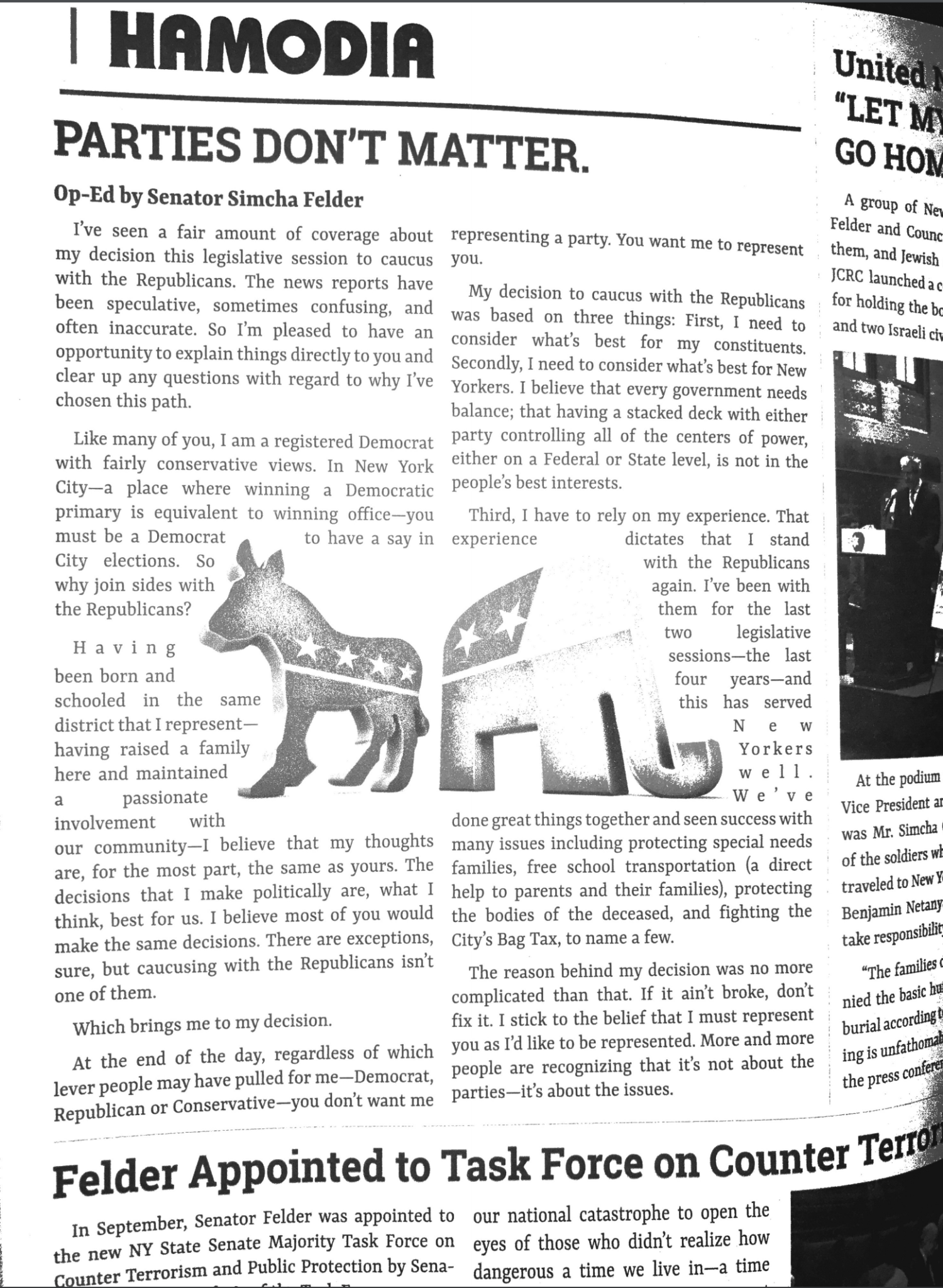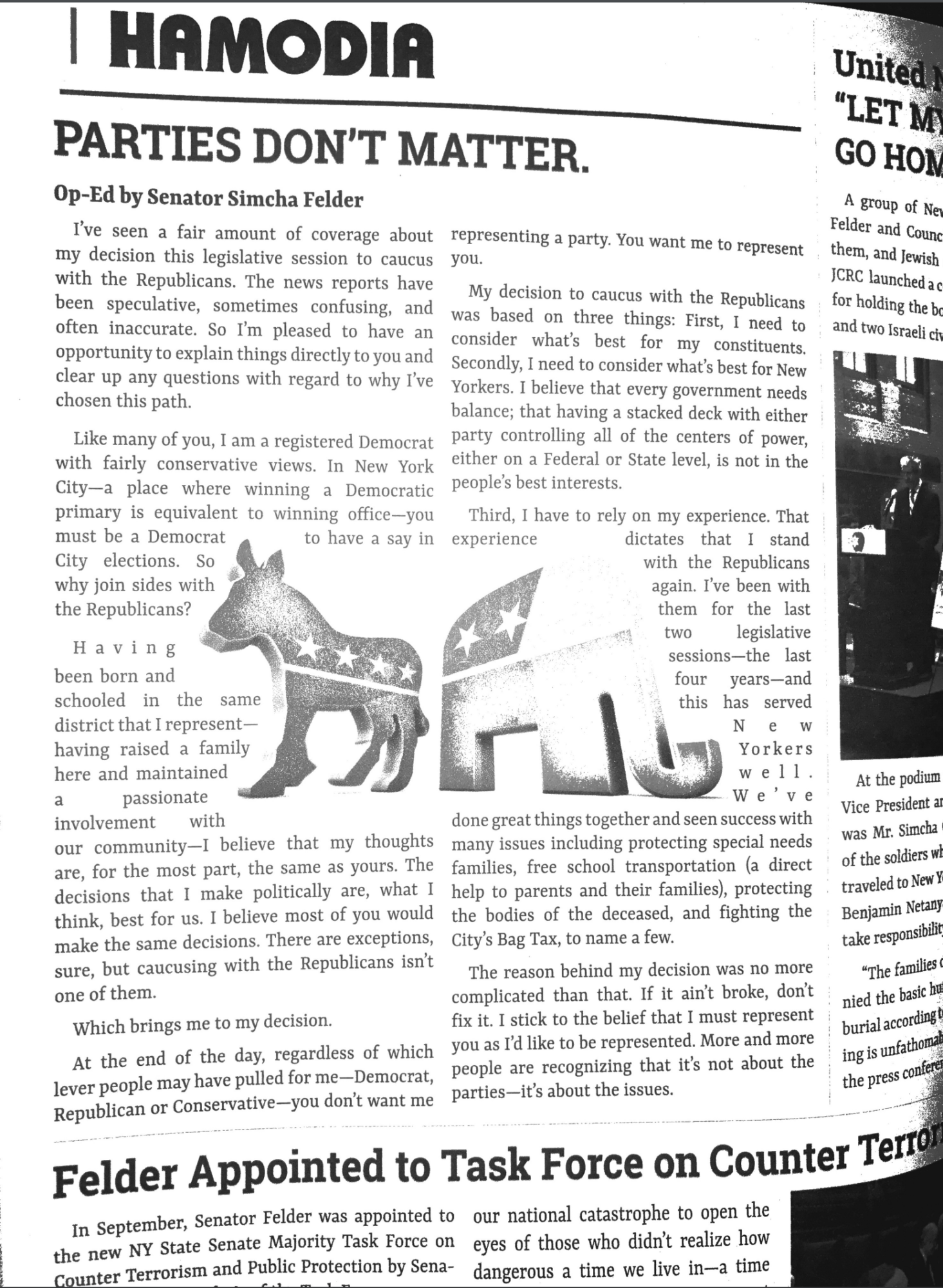Opinion: Political Parties Do Matter


We received the following Opinion Piece from Naomi Rabeeya, a neighbor in State Senator Simcha Felder’s District in response to receiving one of his regular mailings to his constituents (see above). We welcome opinion pieces and letters to the editor on topics that relate to Brooklyn. To submit, please email Editor@bklyner.com.
Saying political parties do not matter is akin to saying labels do not matter.
Imagine buying a box labeled “microwave,” coming home, opening the box and finding you actually have a toaster oven. Please go with me on this one. Labeling something as a microwave gives me expectations of what the device will do. I am certain I know what I am getting because there is shared societal agreement of what the word “microwave” means. It would be jarring to be told that it does not matter if the box was labeled microwave or toaster oven because, sure, they both warm up food. But, they do so in fundamentally different ways. Labels matter.
Parties matter as they connect people to government through shared values. Knowing a candidate’s political affiliation helps constituents trust that they can predict the stances the person will take if elected to office. This does not mean that a politician must vote with their party 100% of the time nor that they should not push for changes to their party.
That being said, politicians are accountable to the fundamental ideals that the party embraces and we would expect them to vote with their party most of the time. Otherwise, they ought to find a different party. Practically speaking, even if one does not agree that we should have parties for ideological reasons, the constitution of New York State enshrines their power: The party in power controls what issues and bills are voted upon.
Simcha Felder, a New York State senator from Brooklyn, is a registered Democrat and runs on the Democratic, Republican and Conservative Party lines and votes with the Republicans in the Senate, giving them control of the chamber. In an op-ed in his April 2017 Felder Focus (page 4), a newsletter he sends to his constituents, he claims to caucus with Republicans because it is best for his constituents and for New Yorkers as a whole; he knows this is true based on his experience in passing legislation. He claims that he “must represent you as I’d like to be represented” and “that is it not about the parties ̶ it’s about the issues.”
It is confusing that, for someone who professes that political parties are not central to how he governs, Senator Felder clearly understands how to navigate the party system and relies upon it to get positions of power. He knows to register as a Democrat because then he has more influence in city elections. He knows to caucus with the Republicans in order to be appointed as chair of the Cities Committee and the New York City Education Subcommittee.
Had Felder aligned with the Democrats, it is doubtful he would have been put in these leadership positions, given that his views on New York City and education are outside Democratic norms.
If Senator Felder did not think parties matter, he would run as an independent. When I see a “D” next to someone’s name on the ballot, I expect that person to support most policies and ideologies of the Democratic Party.
Senator Felder voted against increasing the state’s minimum wage, the DREAM Act, and women’s reproductive rights. He has pointedly avoided taking a position on raising the age of criminal responsibility, voting reform, and the New York Health Act, which would provide all New Yorkers with health insurance. These policies that Felder has voted against or on which he will not take a stand would, by and large, help all New Yorkers, including constituents in his district. They also correspond to the shared values of the Democratic Party. There can be no more clear sign that he does not belong in the Democratic Party than his recent award for best Conservative senator in 2016 from the New York State Conservative Party.
Political parties do matter in New York State and have very real effects on its citizens. Saying otherwise is, at best, naive. More likely, it is purposely misleading. A candidate and elected official’s political party should be a rough approximation of their ideology. It is crucial that those of us in Felder’s district and other New Yorkers whose senator’s political party does not match their actions speak out and advocate for change. Otherwise, how do we know who to vote for? How can we be confident what they will do in office? How do we know we are really buying a microwave, and not a toaster oven?
Naomi Rabeeya
Brooklyn, NY